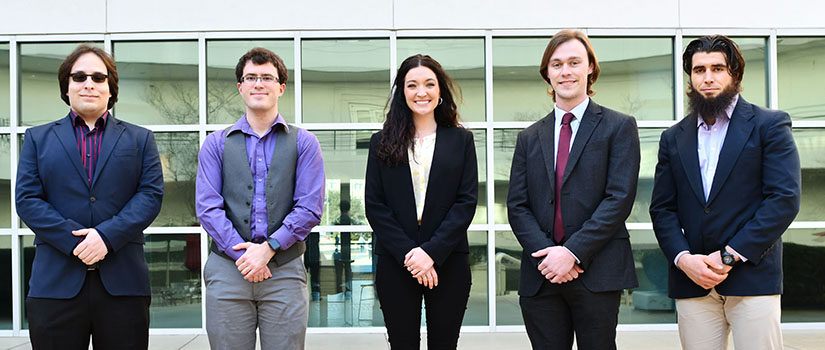Pictured (L-R): Alex Rodriguez, Philip Conrad, Brittany Watson, Colton Kostelnik, Brian Lenhart. Not pictured Angelo Ferraro
The College of Engineering and Computing is proud to announce that six Ph.D. students have been selected as Koerner Family Foundation Fellows. Each student receives a $10,000 stipend supplement in recognition of their research productivity. The recipients represent the biomedical engineering, chemical engineering, computer science, electrical engineering and mechanical engineering programs.
Established in 2001, the Koerner Family Foundation Fellows program provides graduate fellowships to students in various disciplines of engineering at selected universities. The students must be citizens of the United States, have successfully passed their candidacy exams leading to a doctoral degree and expressed an interest in a research career within academia, industry or government in the United States.
“The Koerner Family Foundation has a rich history of supporting engineering doctoral students, and they recognize that great engineering leaders and their achievements played a huge role in making America a great nation,” says Michael Matthews, associate vice president for research. “The fact that the College of Engineering and Computing has six awardees across five of our programs is a testament both to the caliber of these promising individuals and the quality and significance of their work to America.”
The six Koerner Family Foundation Fellows are:
Colton Kostelnik
Ph.D. Candidate, Biomedical Engineering
Faculty Mentor: Dr. John F. Eberth, Department of Cell Biology and Anatomy, University of South Carolina School of Medicine
Kostelnik’s ongoing research involves studying how cryopreservation influences the mechanical and microstructural properties of arteries and the role individual proteins play in these interactions. His future work will build on prior biomechanical studies to explain mechanobiologically-driven inflammatory, fibrotic and thrombotic pathologies that contribute to premature vascular bypass graft failure.
“Receiving any award or honor during graduate school is a very gratifying and validating experience. To me, this fellowship signifies that I am successfully progressing towards a fulfilling and impactful research career in biomedical engineering. This fellowship will support me throughout the final year of my Ph.D. and boost my credentials as I begin searching for a post-doctoral research position.”
Brittany Watson
Ph.D. Candidate, Biomedical Engineering
Faculty Mentor: Professor Melissa Moss, Chair, Department of Chemical Engineering
Watson’s research is focused on the tissue forming a single layer of cells and its response to Alzheimer’s disease associated amyloid-β protein and translating that response to a method of detection for the pre-symptomatic stages of Alzheimer’s disease.
“I am very honored and proud to be recognized as a Koerner Family Foundation Fellow. The foundation’s recognition of my work serves as great encouragement to its completion. As I carry out the final year of my doctoral studies, I look forward to sharing the effects this generous fellowship has had on me and to encourage other engineers to pursue graduate degrees.”
Philip Conrad
Ph.D. Candidate, Computer Science
Faculty Mentor: Professor Jason Bakos
Conrad is currently working on tools and techniques to easily build and deploy online machine learning (ML) models onto accelerators, so ML systems can improve their accuracy and adapt to changing conditions in the field. While most current tools assume a user wants to use a fixed, pre-trained ML model, Conrad’s current research focuses on extending those tools to generate models and code that can adapt, even after they are deployed to the field.
“[Receiving the fellowship] means more time to focus on my ongoing research projects and dissertation.”
Angelo Ferraro
Ph.D. Candidate, Electrical Engineering
Faculty Mentor: Professor Herbert Ginn
Ferraro’s research draws inspiration from models in nature. According to Ferraro, nature is an unforgiving experimental laboratory that tests and provides extensive proofing of system models. And nature’s testing can occur over millennia in refining success. His research hypothesis is that drawing from these proven models, new architectures and system control models can be devised that are more robust and resilient.
“The Koerner Family Foundation Fellowship fosters research to improve engineering knowledge and practice. Support from this award will permit more extensive laboratory testing and simulation of my nature inspired research.”
Brian Lenhart
Ph.D. Candidate, Chemical Engineering
Faculty Mentor: Professor William Mustain
Lenhart is currently working on an industrial research project for Duracell, and two main technologies were established through a collaboration. A new electroanalytical technique for the rapid, off-site conservation measuring of achievable capacity and corrosion stability was developed as well as a scalable technique for Duracell to improve the crystallinity of their active material. These two innovations can help significantly reduce the cost and time dedicated to battery material research and help Duracell increase their edge over competitors by selling a more stable, energy dense product
“Receiving the fellowship signifies external validation and recognition of my hard work, effort, dedication, perseverance and prowess as a critically thinking engineer beyond my immediate circle of peers. It is an honor to receive this award. I am truly humbled and grateful for the recognition.”
Alex Rodriguez
Ph.D. Candidate, Mechanical Engineering
Faculty Mentor: Associate Professor Ming Hu
Rodriguez’s project is the prediction of novel materials with extreme thermal properties. He is specifically using neural networks to predict vibrational properties in crystals that would otherwise be too costly and time-consuming to perform with existing methods. The predictions will give the ability to compute vibrational and thermal properties for a large database of crystals with applications such as heat shielding in spacecrafts or heat-to-electrical conversion in thermoelectric devices.
“I feel strongly about innovation in energy and heat management, as every passing day we are more dependent on electricity to thrive. The development of materials databases will directly contribute to many of today’s renewable energy sources, ranging from solar to nuclear, which is aligned with our ever-increasing energy needs and desire for lower carbon footprint in the environment. Receiving the Koerner Family Foundation is a testament to my dedication toward current and future achievements in providing safer, cleaner and more sustainable energy to the world. With this fellowship, I feel inspired to continue toward my goal of discovering new materials breaching limitations in existing technologies.”
